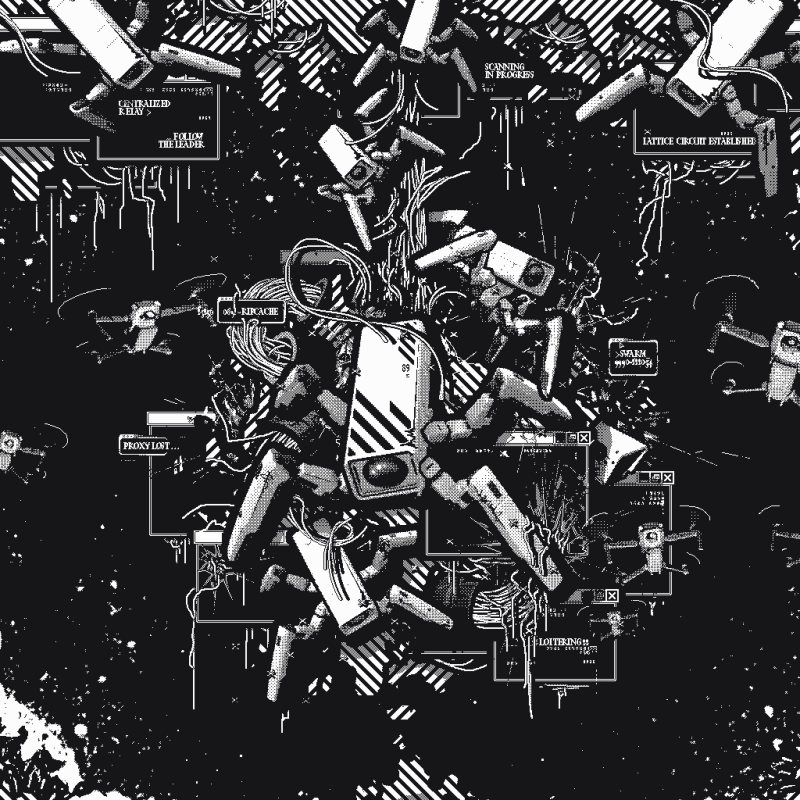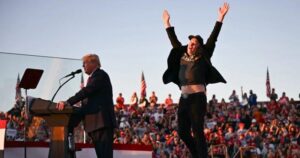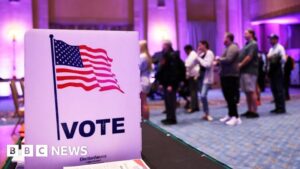Art Under Surveillance: Ripcache’s Radical Take at Bitcoin Amsterdam

Ripcache, a pseudonymous artist, explores themes of surveillance and privacy through a 1-bit pixelated aesthetic. By examining the impact of modern surveillance in centralized and decentralized systems, Ripcache’s work examines trade-offs of the advancing digital age. Their recent series, “Hyperscalers,” was featured on the main stage at Bitcoin Amsterdam, with a private sale facilitated by UTXO Management’s OTC desk to collector Brissi, marking a key milestone in their career and the greater ordinals ecosystem.
We sat down with Ripcache to discuss his art.
Ordinals on Bitcoin create new ways for audiences to engage with digital art. In a world increasingly dominated by surveillance, how does this impact your views on ownership, visibility, and control over art?
Ordinals challenge the status quo about ownership and control. In a way, they democratize access to certain forms of art. In the past, a lot of the art world has been about exclusivity. Artwork hidden away in private collections or in storage, accessible only to a select few. This exclusivity is like a centralized database with limited entry.
In contrast, inscribing art on bitcoin makes it universally accessible. Sure, you still might not own it, but at least anyone with an internet connection can look at it and verify the work without intermediaries. This accessibility and transparency challenges traditional power structures in art ownership and curation. With that said, in an era of pervasive surveillance, this openness also raises questions around privacy and the potential for art and provenance to be co-opted or misused. It’s a delicate balance between visibility and control and advocating for a future where art is both accessible and respectful of individual privacy (for the artist, collector and wider public).

As technologies like blockchain and AI continue to shape the future of digital art, how do you see the relationship between art and surveillance evolving? Could AI offer an alternative narrative to the surveillance-heavy world we inhabit, or only deepen it?
AI and blockchain are actively reshaping our perceptions of surveillance and privacy. While AI does have immense creative potential, in that it can enable new forms of creation and interaction, it also poses risks. The biggest risk is amplifying surveillance capabilities by collecting and processing vast amounts of data, predicting behaviors, and potentially stifling spontaneity.
It’s tough to say definitively, however. AI could deepen the surveillance state but it also has the potential to offer alternatives. Artists already use AI to explore themes of privacy and identity, reclaiming some control over the narrative. And maybe it’s a bit cliche, but I think crypto and bitcoin provide a counterbalance by enabling decentralized and increasingly more anon interactions. With ordinals, artists can share their work with collectors all over the world without centralized oversight, promoting a culture of openness while safeguarding individual freedoms. As this tech evolves, I think it’s crucial that we actively shape them to enhance rather than diminish our creative and personal liberties.
Incorporating motifs like CCTV and drones into your work raises questions about the tension between the peer-to-peer aspect of Bitcoin and the omnipresence of surveillance. Are you concerned that systems meant to decentralize power may still be co-opted by regulatory forces or contribute to an increasingly digital panopticon?
The risk of decentralized systems being co-opted is a real concern. My use of motifs like closed-circuit TV cameras and drones is an attempt to highlight this tension. These symbols represent the watchful eyes of surveillance, prompting viewers to consider how technologies intended for empowerment can be repurposed for control.
Financial transparency on bitcoin is empowering. It has the potential to hold institutions accountable, but it can also expose personal data if not carefully managed. There’s a paradox where increased openness can lead to decreased individual privacy. To prevent decentralization from contributing to a digital panopticon, it’s important to advocate for technologies that prioritize user privacy, like zero-knowledge proofs, and to stay vigilant about regulatory developments.
Art can play a role in this discourse by bringing these issues to the cultural forefront and by encouraging proactive engagement with the cypherpunk ethos as well as the second and third order implications of technology.
#Art #Surveillance #Ripcaches #Radical #Bitcoin #Amsterdam
News plays a pivotal role in our lives by keeping us informed and connected to the world. It serves as a critical source of information, offering updates on current events, politics, economics, science, and more. Through news, we gain awareness of global issues and local developments, helping us make informed decisions in our personal and professional lives. News also fosters discussion and debate, encouraging critical thinking and perspective-taking. Moreover, it promotes transparency and accountability among governments, businesses, and other institutions. In a rapidly changing world, staying updated with the news enables us to adapt to new challenges and opportunities, shaping our understanding of the complexities of society. Ultimately, news is not just about information; it empowers us to participate actively in the world around us, contributing to a more informed, engaged, and responsible global citizenry.
Health is fundamental to our well-being and quality of life, making it an essential aspect of daily existence. It encompasses physical, mental, and emotional aspects, influencing our ability to function effectively and enjoy life fully. Prioritizing health allows individuals to maintain optimal physical fitness, reducing the risk of diseases and promoting longevity. Mental health, equally crucial, affects our cognitive abilities, emotional stability, and overall happiness. Investing in preventive healthcare through exercise, balanced nutrition, and regular medical check-ups helps in early detection of potential health issues, ensuring timely intervention and treatment. Beyond individual benefits, a population’s health impacts societal productivity and economic stability. Governments and organizations worldwide emphasize public health initiatives to address pandemics, health disparities, and promote overall well-being. Ultimately, health serves as the foundation upon which we build our lives, influencing our ability to pursue goals, nurture relationships, and contribute meaningfully to society.
Money plays a crucial role in our lives as a means of financial security and freedom. It enables us to meet basic needs such as food, shelter, and healthcare, while also providing opportunities for education, travel, and personal growth. Beyond material comforts, money facilitates social connections and experiences that enrich our lives. It empowers individuals to invest in their futures, whether through savings, investments, or entrepreneurial ventures, thereby fostering economic stability and growth. However, the pursuit of wealth should also be balanced with ethical considerations, as money can influence relationships and societal dynamics. Responsible management of finances is key to achieving long-term goals and mitigating financial stress. Ultimately, while money is a tool for achieving aspirations and fulfilling desires, its true value lies in how it is utilized to improve both personal well-being and the broader community.
Earning Easy Money in 2024: Opportunities and Considerations 💸
In 2024, the landscape of earning easy money presents diverse opportunities, albeit with considerations. The digital age offers platforms for freelancing, online trading, and e-commerce, allowing individuals to leverage skills and creativity for financial gain. Cryptocurrency investments continue to allure with potential for quick profits, yet they entail high volatility and risk. Moreover, the rise of the gig economy enables flexible work arrangements through apps and websites, offering quick payouts but often without job security or benefits. Passive income streams such as rental properties and investments in stocks or bonds remain viable, but demand initial capital and ongoing management. Amid these options, caution is essential to avoid scams and unsustainable ventures promising overnight success. Ultimately, while the allure of easy money persists, informed decisions, diligence, and a long-term perspective are crucial for sustainable financial growth and security in the dynamic year ahead.





